
For many Americans, eating a chocolate bar is a relatively cheap and easy way to satisfy a sweet tooth. And chocolate's ubiquity — you can find it in convenience stores, pharmacies and online — means it's not hard to get your hands on when a craving calls.
But in other parts of the world, chocolate is considered an extravagance, Mary Linnell-Simmons, Fairtrade America's director of marketing, tells LIVESTRONG.com. Fairtrade America is a non-profit organization that works directly with companies to ensure that farmers and workers in developing countries are given a fair deal in growing their goods.
Video of the Day
Video of the Day
"It comes down to poverty," Linnell-Simmons explains. "Some of the lowest-paid farmers are operating in West Africa and growing cocoa, which is still considered a luxury item. To keep up with demand from chocolate companies and cut costs, these farmers are resorting to drastic measures, such as child labor," she says.
Cocoa Farms and Child Labor
More than 70 percent of the world's cocoa comes from countries in Western Africa, such as Ghana, the Ivory Coast and Cameroon, where farmers are often paid very little for their crop, according to the International Food Information Council. As a result, farmers sometimes rely on child labor to increase their productivity and save operational costs.
Unfortunately, the use of child labor in cocoa farms has been a decades-long issue.
"A child should be in school, but their family owns a cocoa farm and needs help," Linnell-Simmons says. "Instead of going to school, they go to the cocoa farm. Farmers are making these difficult decisions about the future of their children."
Fairtrade America says it's not uncommon for cocoa farmers to receive only one paycheck a year, which they must allot for household and farm costs, equipment, schooling and other necessities.
Green America, a non-profit organization dedicated to promoting social justice and environmental health in the marketplace, reports that 60 percent of cocoa farmers earn less than $2 a day.
How Buying Fair Trade Helps Prevent Child Labor in Cocoa Farms
Third-party organizations like Fairtrade America help keep chocolate companies accountable.
Fairtrade will audit the full supply chain, ensuring that buyers aren't getting more product than what they paid for. "We only certify family farms and smaller farms — not mega-estate plantations," Linnell-Simmons says. "These farmers join a cooperative, and we will audit for our farm-level standards."
These standards include:
- not using child labor
- not using pesticides harmful to the environment
- protecting water sources
- contributing to the community
"We step in to make sure cocoa farmers get what they deserve. We have a baseline program for cocoa farmers to help them get out of the cycle of poverty," says Linnell-Simmons, explaining that the organization sets a fair trade minimum price and a fair trade premium to ensure crop-growers are justly compensated.
"Vote with your wallet and put money where your values are. Chocolate is not as convenient and cheap as you might think."
The fair trade minimum price is essentially the floor price chocolate companies must pay to do business with a cocoa cooperative, says Linnell-Simmons. This price covers the costs of the sustainable production, which includes labor, fertilizers, pesticides, seeds, water and processing and export costs.
The fair trade premium is an additional amount paid in a lump sum by chocolate companies. Cooperative members decide how to spend the money from the fair trade premium. Farmers might put it toward paying for education, community services or healthcare.
"A community might need a medical facility, for instance, so the fair trade premium can go toward paying for the costs of building one," Linnell-Simmons says.
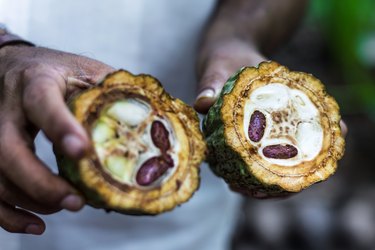
The Perfect Fair Trade System Does Not Yet Exist
It's important to note that while Fairtrade's farming standards prohibit child labor, the certification system won't absolutely guarantee that a product is completely free of child labor.
Fairtrade can only promise that if a farm violates child labor rules, they will work to protect the child and work with the farmers to ensure it doesn't happen again. Fairtrade also encourages farmers to follow sustainable farming practices, but it doesn't mandate all specific practices.
"We ban the use of GMO seeds and advocate for farmers to follow better practices whenever possible. We don't say, 'you must grow organic,' but if a farmer chooses to do organic farming, we support them and enable them to learn from each other," Linnell-Simmons says.
There's also an emphasis on sharing. If one farmer discovers a sustainable farming technique that increases their productivity and yield, Fairtrade helps them share it with other farmers in their cooperative.
Fairtrade also promotes complementary crop farming, which focuses on symbiotic techniques, like keeping bees to sell honey at fair trade while pollinating their crops.
What You Can Do to Support Ethically Sourced Chocolate
Ultimately, people can help cocoa farmers by educating themselves about the source of their chocolate while buying from food companies that ethically source their cocoa. You can also ask your local grocery stores to carry more fair trade products, including chocolate.
"Most people like chocolate, but don't know what a cocoa plant looks like or where it grows. Getting more aware and learning more about what it looks like and where it grows can help you understand where it comes from," Linnell-Simmons says.
"Vote with your wallet and put money where your values are. Chocolate is not as convenient and cheap as you might think."
Exactly What to Look for on a Fair Trade Chocolate Label
Some chocolate companies will deceptively claim to be fair trade while they are not actually ethically sourced. To ensure you're truly buying fair trade chocolate, make sure to look for these approved fair trade labels on products.
Fair trade labels are nuanced, if not a little confusing, so read the label descriptions carefully to ensure that you're buying a product you intended to purchase.
For example, the Fair Trade Certification mark certifies that all ingredients in the product are from fair trade sources. On the other hand, the Fair Trade Certified label means that only the cocoa in the product is certified fair trade.
"The product packaging is a great place to review the ingredient statement and nutrition and allergen information of a product," Candace Pumper, RD, LD, a dietitian at the Ohio State University Wexner Medical Center, tells LIVESTRONG.com. "Higher-quality fair trade chocolate products will have the fewest ingredients with cacao beans and cocoa mass (chocolate liquor) listed first."
Pumper says you might also see different forms of cocoa listed, such as cocoa nibs, cacao butter and cacao powder. (Other ingredients include cane sugar, coconut sugar, inulin, milk fat or powder, lecithin and vanilla pods or vanilla extract.)
To help you choose the healthiest fair trade dark chocolate bars, here are some of Pumper's tips:
- Choose chocolate bars with at least 70 percent cacao. To reap the health benefits of cocoa, choose dark chocolate bars containing at least 70 percent cacao solids. Just keep in mind that the higher the percentage of cacao, the richer and more intensely bitter the flavor will be.
- Go for minimal or no added sugar. "When shopping for fair trade dark chocolate, look for varieties with 150 to 200 calories and 10 grams of sugar or less per serving, and those without added sugars," Pumper says.
- Try to avoid alkalized cocoa. "Look for brands that have not been treated with alkali." The process of alkalizing chocolate removes many of the beneficial properties in cocoa.
- Consider bars with dried fruit and nuts. "Nuts contain high amounts of monounsaturated fatty acids, especially hazelnuts, and also provide vitamin E, B vitamins, iron, calcium, magnesium, among other nutrients," Pumper says. Nuts also promote better blood sugar control, heart health and good gut bacteria, she says.
Dried fruit in dark chocolate can also provide a touch of sweetness without added sugar. "Dried fruits are high in fiber, potassium and varying levels of micronutrients. They also contain various bioactive compounds with high antioxidant and anti-inflammatory activity," says Pumper.
Tip
Because dark chocolate is calorie-dense, you'll want to stick to a one-ounce serving (about 28 grams) per day, Pumper says.
8 Fair Trade Chocolate Bars to Try
1. Theo
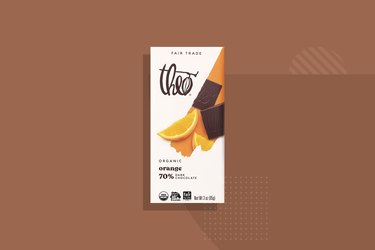
Per 1/3-bar serving of Dark Chocolate Orange: 170 calories, 11 grams fat (6 grams saturated fat), 0 milligrams sodium, 14 grams carbohydrates (3 grams fiber, 9 grams sugar, 9 grams added sugar), 2 grams protein
Theo's chocolates are sourced from fair trade cocoa farms in Central and South America and Africa, working directly with farmers from the Norandino Cooperative in Peru and the Esco-Kivu Cooperative in the Democratic Republic of the Congo.
"Theo tops my list for their on-going commitment to high-quality ingredients and equitable and transparent practices across the entire supply chain," Pumper says. "Annual visits to their cocoa origins are a very important part of what they do to better understand suppliers' challenges and to ensure producers are given fair pay and work under fair labor conditions."
All of their dark chocolate bars are 70 percent cacao and feature mouthwatering flavors, such as sea salt, ginger, dark chocolate orange and coffee toffee.
And if a chocolate bar doesn't exactly tickle your fancy, they also have chocolate peanut butter cups and peppermint patties. Plus, they sell chocolate barks for baking (you know your chocolate chip cookies and banana bread could use an upgrade).
Buy it: Amazon; Price: $23.94 per pack of 6
2. Alter Eco
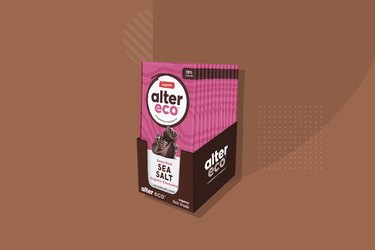
Per 30-gram serving of Deep Dark Sea Salt: 180 calories, 13 grams fat (8 grams saturated fat), 55 milligrams sodium, 14 grams carbohydrates (3 grams fiber, 12 grams sugar, 8 grams added sugar), 3 grams protein
Alter Eco's chocolates are crafted with sustainability and fair trade in mind, working directly with small-scale farmers and workers across the world.
For example, they work with cacao farmers in the Acopagro Cooperative in Peru, the Fair Trade Alliance Kerala in India for their coconut oil and the Nuevo Amanecer Cooperative in Bolivia for their quinoa.
As another one of Pumper's top picks, Alter Eco's chocolates contain a variety of cacao content, ranging from 60 percent to as dark as 90 percent, for your own personal liking.
Buy it: Amazon; Price: $45.20 per pack of 12
3. Endangered Species
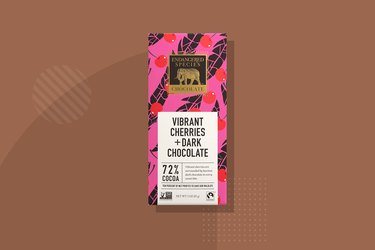
Per one-ounce serving of Vibrant Cherries + Dark Chocolate: 160 servings, 10 grams fat (6 grams saturated fat), 0 milligrams sodium, 15 grams carbohydrates (3 grams fiber, 9 grams sugar, 7 grams added sugar), 2 grams protein
When you buy a chocolate bar from Endangered Species, you'll support the fair trade cocoa farmers in West Africa. In addition to the fair trade minimum price, Endangered Species pays premiums to the farmers.
They also have a 10 percent GiveBack program, in which they donate 10 percent of their annual profits to their partners, like The National Forest Foundation and The Dian Fossey Gorilla Fund.
Endangered Species' efforts to support fair trade and wildlife are commendable, but even so are their chocolates. They even have an oat milk, almonds and dark chocolate bar for plant-based chocolate lovers.
Buy it: Amazon; Price: $45.31 per pack of 12
4. Divine
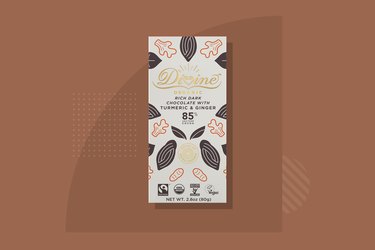
Per 30.6-gram serving of Dark Chocolate With Turmeric & Ginger: 170 calories, 13 grams fat (8 grams saturated fat), 0 milligrams sodium, 14 grams carbohydrates (4 grams fiber, 6 grams sugar, 6 grams added sugar), 3 grams protein
Founded by a group of cocoa farmers in Ghana, Divine chocolates is one of the first farmer-owned fair trade chocolate companies. Known as the Kuapa Kokoo Cooperative, they began with a membership of 2,000 farmers across 22 villages in Ghana, and today, they operate in two markets in the U.S. and the United Kingdom.
From bars to snacks, Divine's chocolates don't skimp on quality or flavor. Their organic line of dark chocolates boast 85 percent cacao and use USDA-certified organic ingredients. For example, one of their dark chocolate bars contains turmeric and ginger, which provide anti-inflammatory benefits while enriching it with a spicy twist.
Buy it: Amazon; Price: $3.99 per bar
5. KIND Bark
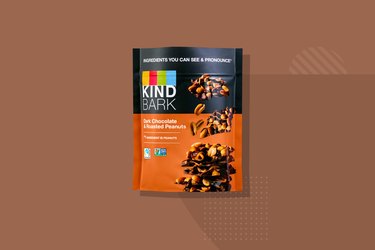
Per 1/3-pack serving of Dark Chocolate & Roasted Peanuts: 180 calories, 14 grams fat (5 grams saturated fat), 35 milligrams sodium, 15 grams carbohydrates (3 grams fiber, 10 grams sugar, 9 grams added sugar), 4 grams protein
You might already be buying KIND's delicious granola bars, but you'll be happy to know that their new barks are fair trade certified.
They come in three taste-tempting combos: Dark Chocolate and Roasted Peanuts, Dark Chocolate Almond and Sea Salt and Dark Chocolate Almond and Salted Caramel.
Buy it: Amazon; Price: $14.02 per pack of 4
6. 3 Some Chocolates

From alcohol-spiked chocolate dips to decadent-tasting chocolates, 3 Some Chocolates are all about giving not one but three different chocolates (dark, milk and white) in one bar.
The best part is that they are made with premium fair trade cocoa beans from the Ivory Coast and Ghana. In fact, for every pack of chocolates you buy, they donate a portion to sustainable cocoa farming through the Cocoa Horizons Foundation.
Buy it: 3 Some Chocolates; Price: $19.99 per pack of 3
7. Unreal
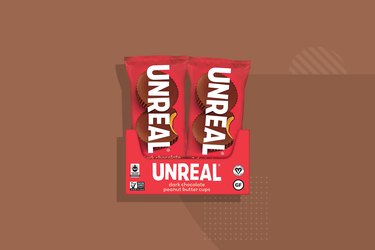
Per serving of Dark Chocolate Peanut Butter Cups: 80 calories, 6 grams fat (2.5 grams saturated fat), 40 milligrams sodium, 7 grams carbohydrates (1 gram fiber, 5 grams fiber,), 1 gram protein
If you grew up eating candy-coated chocolates, peanut butter cups and chewy caramel chocolate bars, you'll love Unreal's much healthier treats that kids and adults alike will love.
Made with fair trade cocoa, Unreal's chocolate treats contain zero artificial colors and sweeteners. To get their bright-colored shells, they use natural ingredients, like turmeric extract, beetroot, carrot and hibiscus juice.
Buy it: Amazon; Price: $25.17 per pack of 12
8. Lily's
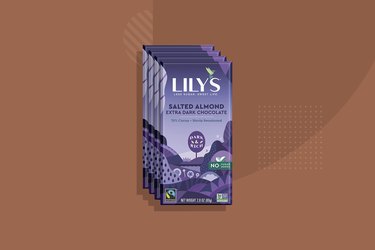
Per 30-gram serving of Salted Almond Dark Chocolate: 140 calories, 12 grams fat (6 grams saturated fat), 50 milligrams sodium, 13 grams carbohydrates (8 grams fiber, 0 grams sugar, 0 grams added sugar, 4 grams erythritol), 3 grams protein
Trying to wean off of your sugar obsession? Consider Lily's chocolates, which are sweetened with stevia and erythritol instead of cane sugar. You can also feel about their cocoa being fair trade certified and non-GMO verified.
Choose from a variety of dark chocolates made with 55 percent, 70 percent, 85 percent and 92 percent cacao. And if you're looking for some chocolate chips for baking, they've got a sweet selection of dark chocolate, white chocolate, chocolate salted caramel and more.
Buy it: Amazon; Price: $26.41 per pack of 4
- International Food Information Council: "Unwrapping Our Chocolate: Cocoa Processing Insights"
- Fairtrade: "Fairtrade Fights Poverty"
- Green America:"End Child Labor in Cocoa"
- Fairtrade: "Fairtrade Minimum Price and Premium Information"
- Fairtrade: "Cocoa: Product Standard for Small-Scale Producer Organizations"
- Green America: "Child Labor in Your Chocolate? Check Our Chocolate Scorecard"
- Ohio State University Wexner Medical Center